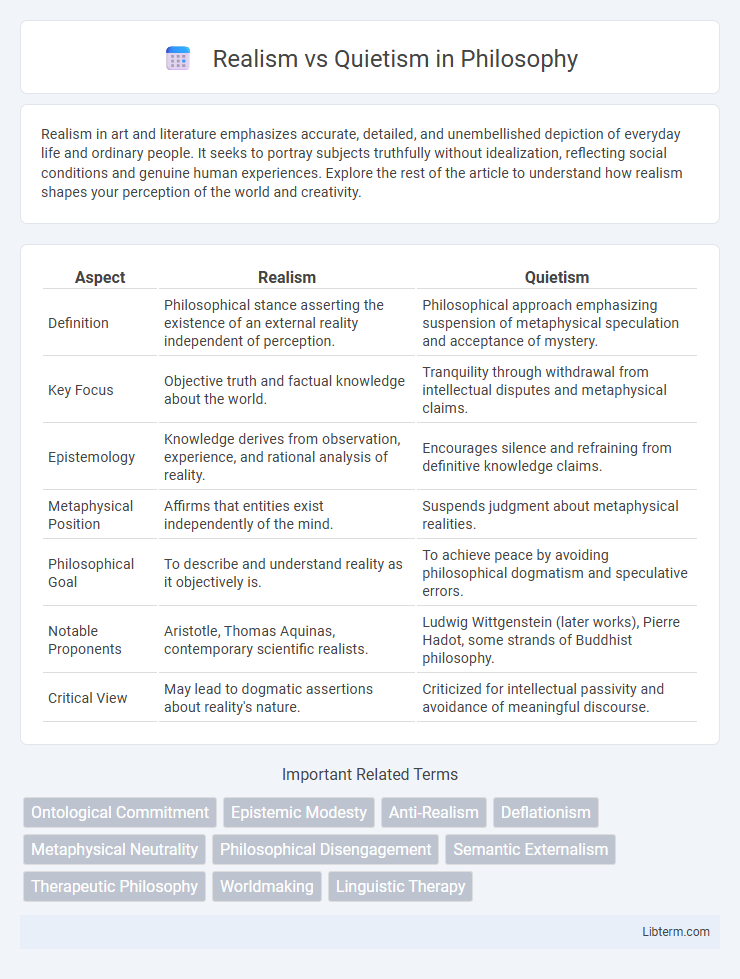Realism in art and literature emphasizes accurate, detailed, and unembellished depiction of everyday life and ordinary people. It seeks to portray subjects truthfully without idealization, reflecting social conditions and genuine human experiences. Explore the rest of the article to understand how realism shapes your perception of the world and creativity.
Table of Comparison
| Aspect | Realism | Quietism |
|---|---|---|
| Definition | Philosophical stance asserting the existence of an external reality independent of perception. | Philosophical approach emphasizing suspension of metaphysical speculation and acceptance of mystery. |
| Key Focus | Objective truth and factual knowledge about the world. | Tranquility through withdrawal from intellectual disputes and metaphysical claims. |
| Epistemology | Knowledge derives from observation, experience, and rational analysis of reality. | Encourages silence and refraining from definitive knowledge claims. |
| Metaphysical Position | Affirms that entities exist independently of the mind. | Suspends judgment about metaphysical realities. |
| Philosophical Goal | To describe and understand reality as it objectively is. | To achieve peace by avoiding philosophical dogmatism and speculative errors. |
| Notable Proponents | Aristotle, Thomas Aquinas, contemporary scientific realists. | Ludwig Wittgenstein (later works), Pierre Hadot, some strands of Buddhist philosophy. |
| Critical View | May lead to dogmatic assertions about reality's nature. | Criticized for intellectual passivity and avoidance of meaningful discourse. |
Introduction to Realism and Quietism
Realism emphasizes pragmatic engagement with political and social realities, advocating for power, security, and national interest as guiding principles in decision-making. Quietism, in contrast, promotes political passivity and skepticism toward intervention, prioritizing moral restraint and avoiding unrealistic aspirations for change. The debate between Realism and Quietism centers on their differing views of human nature, the role of ethics, and the effectiveness of active political strategy.
Historical Origins of Realism
Realism in political philosophy emerged prominently during the Renaissance with thinkers like Niccolo Machiavelli, whose works emphasized pragmatic statecraft and power dynamics over moralistic ideals. This tradition contrasts sharply with Quietism, which advocates for political disengagement and spiritual passivity. The historical origins of Realism are deeply rooted in the turbulent political landscapes of 15th and 16th century Europe, reflecting a shift towards empirical observation of international relations and human behavior.
Philosophical Foundations of Quietism
Quietism's philosophical foundations rest on the belief that intellectual and existential tranquility arises from suspending dogmatic assertions and embracing a form of radical skepticism. This approach contrasts realism by rejecting metaphysical commitments, advocating instead for an attitude of contemplative detachment and the avoidance of philosophical disputes. Quietism emphasizes clarity and the dissolution of conceptual confusion, promoting peace of mind through the cessation of theoretical debates.
Key Differences Between Realism and Quietism
Realism emphasizes practical engagement with political power and the pursuit of national interest, often endorsing the use of force or diplomacy to achieve strategic goals. Quietism advocates for abstention from political activism and intervention, promoting a focus on spiritual development and inner peace over external conflict. The key difference lies in Realism's active approach to worldly affairs contrasted with Quietism's withdrawal and non-resistance philosophy.
Major Thinkers Influencing Each Tradition
Realism in political philosophy is notably influenced by thinkers like Niccolo Machiavelli, who emphasized pragmatic and power-centered approaches to statecraft, and Hans Morgenthau, who articulated the principles of power politics and national interest in international relations. Quietism, by contrast, draws heavily on the ideas of early Christian thinkers such as Augustine of Hippo and later figures like Blaise Pascal, who stressed withdrawal from worldly affairs and an emphasis on inner peace and spiritual contemplation. These major thinkers shape distinct philosophical traditions: Realism prioritizes active engagement and power dynamics, whereas Quietism advocates for passivity and detachment from political struggles.
Realism in Contemporary Philosophical Debates
Realism in contemporary philosophical debates asserts the existence of an objective reality independent of human perception, emphasizing metaphysical and epistemological commitments to truth and knowledge. Philosophers such as Hilary Putnam and Michael Devitt defend robust semantic and ontological realism, arguing that scientific theories accurately describe mind-independent entities and structures. This position opposes Quietism, which recommends a restrained approach to metaphysical theorizing, advocating for dissolving philosophical problems through linguistic or conceptual analysis rather than substantive claims about reality.
Quietism’s Role in Modern Philosophy
Quietism in modern philosophy emphasizes the dissolution of metaphysical problems through linguistic analysis and clarification, rejecting grand theoretical frameworks. It challenges realist positions by arguing that many philosophical disputes arise from misunderstandings of language rather than from substantive issues about reality. Quietism's influence is evident in the works of Ludwig Wittgenstein and later ordinary language philosophers who prioritize practical use of language over abstract theorizing.
Practical Implications of Realism vs Quietism
Realism emphasizes engagement with political and social realities, advocating for pragmatic actions to achieve tangible outcomes, whereas Quietism promotes disengagement from contentious issues to maintain inner peace and moral integrity. In practice, Realism supports proactive policy-making and strategic interventions, while Quietism encourages withdrawal from political conflicts to avoid exacerbating tensions. The practical implications influence decision-making processes, with Realism prioritizing effectiveness and influence, and Quietism prioritizing non-interference and patience.
Criticisms of Realism and Quietism
Criticisms of Realism emphasize its tendency to oversimplify complex political dynamics by assuming states always act in rational self-interest, ignoring moral and ethical considerations. Quietism faces critique for promoting political passivity, potentially enabling injustice by discouraging active engagement or resistance against oppressive systems. Both frameworks are challenged for limitations in addressing the nuanced realities of international relations and domestic governance.
Conclusion: The Ongoing Relevance of the Debate
The debate between Realism and Quietism remains crucial in contemporary philosophy, as it addresses the nature and limits of human knowledge and language. Realism asserts the independent existence of a mind-independent reality, while Quietism emphasizes the dissolution of philosophical problems through linguistic analysis. This ongoing discourse shapes epistemology, metaphysics, and the philosophy of language by challenging assumptions about truth, meaning, and the role of philosophical inquiry.
Realism Infographic

 libterm.com
libterm.com